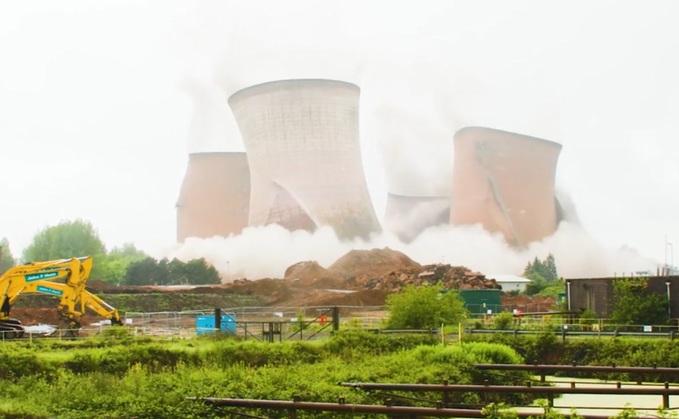
The Rugeley Coal Plant's cooling towers were demolished this summer
Executives from EQUANS and Midlands Energy Hub provide an exclusive insight into the challenges and opportunities faced in planning net zero clean energy and housing developments
At the site where four huge cooling towers once belched coal fumes into the air on the edge of the Midlands town of Rugeley, plans are underway to build 2,300 low carbon homes and a net zero carbon school, in a scheme that hopes to provide a new standard for smart, sustainable, and community-centric development in the UK.
The project is part of an even bigger master transformation plan for the former mining town, which is also aiming to provide green retrofits to thousands of existing homes and create 12 new acres of employment space, a new park, extensive cycling and walking routes, and a neighbourhood centre.
The company leading the project is EQUANS, the energy services unit of French energy company Engie, which operated the Rugeley Power Station before it closed in 2016. With the iconic cooling towers being demolished earlier this summer, the landmark exercise in 'sustainable place-making' is expected to commence in full next year, bringing together a broad band of stakeholders, from academics and community groups to companies and not for profits.
The benefits of the approach being spearheaded at Rugeley were discussed in a BusinessGreen webinar hosted last month, which saw representatives from EQUANS discuss the importance of sustainable business models with the Midlands Energy Hub, an outfit that helps local authorities and local enterprise partnerships deliver low carbon energy projects.
"Sustainable business models re-evaluate business strategy," explained Kiri Rudra, energy and carbon solutions director at EQUANS. "They look at the ambitions of any organisation and seek to create, deliver and capture value for all impacted stakeholders - with the fundamental desire to not deplete economic, environmental, or social capital to deliver sustained growth… Resilient business requires resilient relationships that collaborate together to effectively manage change in economic, environmental and social dynamics."
The company is hoping to showcase how a project devoted to sustainable business models can work in Rugeley, where construction on the various low carbon mobility, housing, and community schemes is set to kick off within months. The four cooling towers that long dominated the landscape were demolished this summer and remediation work is now being done at the site.
"Instead of selling it off the brownfield site to a housing developer, as we normally would do, we thought: 'why don't we - as a company in the energy, facilities management, and house building space - retain that land, take more responsibility and turn it into something that provides sustainable business models?'" explained Christoph Mazur, project lead for Zero Carbon Rugeley.
The various companies behind the initiative - which includes gas utility Cadent, Midlands technology companies Opus One Solutions, and Cognital, as well as a number of local organisations, including a theatre, housing organisation, and community solar group - are aiming to set a new standard for how project developers can engage and enlist communities in their plans. Mazur estimates the project developers reached 5,000 people online or in person while designing the plans - roughly a fifth of the town's populations.
"What we realised pretty quickly, is that when you look at the power station site, you can't do it yourself," he said. "When you want to touch this whole ecosystem, you need to build a whole movement around it and take the whole town with you. Rugeley is a town of 25,000 people and we will be putting 2,300 houses there - adding 6,000 people."
The project's objective, he adds is "to create local value - which translates in Rugeley to lower carbon, lower energy bills, more investment into the place and in the end growth, as well as an active community".
More than 5,000 locals were reportedly engaged about the issues that mattered to them before any designs were drawn up. Mazur stressed it is important the project is designed and built with guidance from the people who understood local priorities and needs. "We needed to have people who actually know the context," he said. "We've got really good buy in from local authorities who own assets, who have the links to local community, as well as from key asset holders."
Serena Bacuzzi, regional senior energy project officer at the Midlands Energy Hub, also provided an overview of how the organisation helps authorities and LEPs to scale net zero priority projects, attract private and public investment, and raise awareness and understanding about local opportunities.
While conceding that the "triggers" that need to be pulled to accelerate projects in different areas vary, she argued that many of the projects the Hub assists face common challenges. A lack of resources, ambition, and capability within local authorities; a lack of leadership and collaboration at a regional level; a lack of capital, particularly at the first stages of project development; and "varied" performance and slow progress from public sector bodies and local authorities when it came energy and climate change action, were highlighted as some of the issues developers typically have to wrestle with.
However, local schemes can overcome these challenges if they build the right foundation to their projects, Bacuzzi argued, explaining that this was where her team can help. The Midlands Energy Hub provides leadership support to organisations while touting the benefits of eschewing a business-as-usual approach in favour of an "innovative approach" like the one being tested in Rugeley, she said.
"Overall, a green project is worth progressing if it can provide benefits and opportunities for local community and area," she argued. "It needs to enable local generation, support development of skills, create jobs, improve quality of life of local community, support economic growth, but also investment in region for growth."
Bacuzzi urged planners to stress the long-term co-benefits generated by a net zero, community-based approach to town planning or housing development. "We need to see long-term vision and long-term funding support and not be limited to a short period of time," she said. "That way we can reduce the number of households living in fuel poverty and hopefully we will see more schemes that help communities struggling on energy issues."
Mazur said the Zero Carbon Rugeley scheme was working to raise further investment from a raft of different potential investors, ranging from institutional investors and pension funds to individuals via crowd funding campaign, and planned to attract investment by setting out the long-term benefits of the scheme for the community, the environment, and their returns.
He added that up-front investment could also be offset by falling energy costs of consumers, fewer ongoing maintenance issues, rental agreements that consider homes' lower energy consumption. And he detailed how the various parts of the project could be packaged together to make them more attractive investors. "In Rugeley, there are 9,000 houses we would like to retrofit," he explained. "While it is more expensive to do a ;deep retrofit', when you package it up with smart technologies, PV, battery storage - in other words, bundle up those energy assets - you can then access different types of value, such as flexibility contracts with suppliers. Yes, it is more expensive, but you can recoup some or all costs through smart contracts and relationships."
Rugeley is set to be a place to watch over the coming years as plans for the low-carbon development are finalised and the town starts to physically transform. The question is whether the project can inspire other energy, facilities management, and housing companies to challenge deeply entrenched notions of what constitutes business value.
BusinessGreen's webinar was hosted in association with EQUANS.









